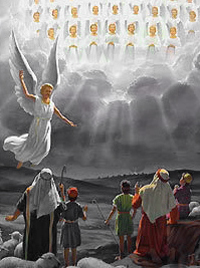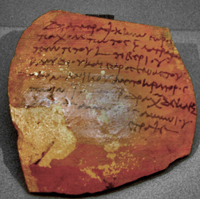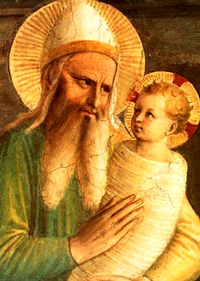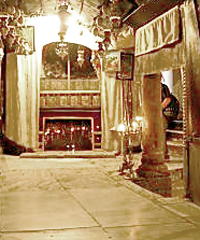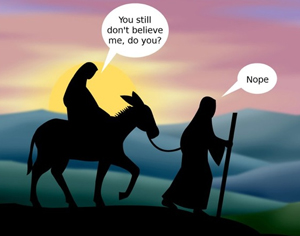
Discuss the world's favourite imaginary friend on the JNE YouTube channel
Luke – "Angels but no star"
Having heard the chorus from a heavenly host, Luke's shepherds find the infant Jesus without the aid of any star.
"And they came with haste, and found Mary, and Joseph, and the babe lying in a manger." – Luke 2.16.
In fact, Luke knows nothing of the star so important to Matthew's rival yarn.
* Who's the Messiah?
The Talmud ascribes the Jewish sage Johanan ben Zakkai (c. 30-90 AD), head of the Yabneh rabbinic school, with the last words, "prepare a throne for Hezekiah, the King of Judah, who is coming." (Berakhot 28b).
Other rabbis considered that the messianic hope had already been fulfilled in the historical Hezekiah.
Etymology
"Hezekiah, more properly transliterated as Ḥizkiyyahu ... can be said to mean something like "Strengthened by YHWH" "
"Double portion for the Jews" says Isaiah
Time's Up
In the time of Hezekiah's great grandson, Josiah, Assyrian power collapsed but even that did not save "the house of David".
Egypt, under pharaoh Necho, was now an energetic ally of a weakened Assyria, and his army destroyed Josiah and his warriors on the way north to aid the Assyrians.
Within twenty years Judah was no more, conquered by the new superpower Babylon. The line of the kings of Judah came to an end and the hate-filled ramblings and vainglorious promises of Isaiah were exposed as the pious nonsense that they ever were.
"Your people .., shall inherit the land for ever ... the sons of the alien shall be your ploughmen and your vine dressers ... Men shall call you the ministers of our God. You shall eat the riches of the Gentiles ... Instead of your shame there shall be a double portion..."
– Isaiah 60.21-61.7 .
How wrong can you be?
With their poster boy Josiah eliminated and the "Davidic line" at an end, emigre priests in Babylon began fabricating Judaism anew.
Why waste a good yarn?
Isaiah was plundered yet again for nativity imagery when the brethren noticed a reference to a crib, ox and a donkey! Yippee!
Isaiah was actually sounding off about the wickedness of Judah whose people, he said, were dumber than farm animals – but hey, who cares?
"The ox knows its owner
And the donkey its master’s crib." – Isaiah 1.3.That's it! That's Jesus!
Taxing in the Provinces
Evidence for a head tax in Egypt in the fifth regnal year of the emperor Claudius (45 AD).
Among other known censuses are Gaul (27 BC), Germania (9 AD) and Pannonia (10 AD).
Censuses are more evident from Egypt, a vital province because it provided a third of Rome's grain supply.
A decree from the prefect of Egypt in 104 AD ordered migrant workers to return to their family (but not "ancestral") home. Knowledge of this may have influenced the author of Luke.
The Bible – a good book?
"Death for premarital sex"
Mary was certainly taking a risk. As the Bible would have it, sex out of wedlock demanded stoning to death:
"If there is a betrothed virgin, and a man meets her in the city and lies with her, then you shall bring them both out to the gate of that city, and you shall stone them to death with stones, the young woman because she did not cry for help though she was in the city, and the man because he violated his neighbour’s wife.
So you shall purge the evil from your midst."
– Deuteronomy 22:23-24.
** Orthodox tradition holds that Simeon was one of the original translators of the Septuagint (Alexandria 3rd century BC). He was 360-years-old when he beheld Jesus in the temple.
Kinda says it all.
Born in a Stable?
Was Jesus born in a stable? Or a barn? Or a cave?
Luke* says only a manger. There was no room for him in the kataluma ("inn" or guest room).
But Joseph supposedly had returned to his ancestral home, "the lineage of David". So the place should have been chock-full with his own relatives. And not one of them would accommodate a heavily pregnant woman? Tut-tut.
The reality is that the story of Jesus is enhanced by the "humble birth".
Early Christians were taken by the idea that he was, in fact, born in a cave. Can you get any more humble than that?
* Matthew, a tad more realistic, says, "And when they had come into the house ..." (2.11).
The Cave
In the 4th century construction of the Christian dreamscape a church was built over a conveniently located cave in Bethlehem – over, that is, a cave previously consecrated to the worship of Adonis-Tammuz (Lord Tammuz).
A grander version of the church was built by emperor Justinian and much of it remains today, still featuring "the cave of the nativity".
Church Father offers evidence of Cave plus Manger
"With respect to the birth of Jesus in Bethlehem, if any one desires, after the prophecy of Micah and after the history recorded in the Gospels by the disciples of Jesus, to have additional evidence from other sources, let him know that, in conformity with the narrative in the Gospel regarding his birth, there is shown at Bethlehem the cave where he was born, and the manger in the cave where he was wrapped in swaddling-clothes."
– Origen. Contra Celsus, I, 51.
Last word
|
Neither Mark nor Paul, nor any of the other writers of the New Testament letters, know of Jesus's birth to a virgin; in fact, they show no awareness of his nativity at all. Though collectively all are earlier writers than Matthew and Luke, they evidently know least about his birth. Perhaps even more surprising, the authors of John, though certainly aware of the birth tales presented by Matthew and Luke, have passed over those stories as unworthy of a mention in their own gospel. But for all that, the pretty tale of miraculous birth and fulfillment of ancient prophecy has delighted and enthused generations of Christians who, with simple faith, are able to weather the harsh storm of rationality and objectivity with a halfwit's beaming smile. Hey, it's Christmas.
No nativity yarn in Epistles, Mark or John In the letter to the Galatians, the writer of this particular Pauline epistle stresses one point about the birth of the Christ – and it is not the extravagant claim that he was born to a virgin. It is the rather prosaic claim that the birth conformed with Jewish Law (in other words, that Christ was born a Jew):
The only other occasion where the Pauline writers are at all concerned with the birthing of Jesus is Romans 1.1-3. and here the reference is to "human seed", not the agency of divine spirit:
The author of Mark is another who has no story of a holy virgin or divine impregnation. Mark's Jesus makes his first appearance as an adult, not a child, and there is no later referral to any supernatural, or even natural, birth. Mark sketches in the barest detail regarding his hero's origin. His Jesus came "out of Galilee", emerging from the city of Nazareth for his baptism by John. But that is all Mark has to say on the matter. Perhaps more telling is the treatment of Jesus' origin in the gospel of John. Here, the author, though he almost certainly knew the earlier fables dreamed up Matthew and Luke, like Mark, has no interest in any human genesis of his "Word of God made flesh". John states very clearly that Jesus was "the son of Joseph" (John 1.45; 6.42.) – which could hardly have left Mary a virgin. Again, like Mark, he prefaces his story of Jesus with a preamble about John the Baptist and when the "Light" and the "lamb" first appears it is as an adult. Later in his gospel, John's Pharisees discuss the Christ and they are clearly under the impression that Jesus had no connection with Bethlehem (John 7), a belief shared earlier in his tale by the soon-to-be disciple Nathanael. Not even the evangelist John is sold on the fantastical "virgin birth" yarn!
Fulfilled Prophecy? No, just cut and paste
No one in the New Testament actually calls Jesus "Emmanuel". The prophet who supposedly made this prophecy was Isaiah, although "Isaiah" is at least three writers, composing material over a period of two hundred years. First or "proto" Isaiah, sometime in the 8th-7th century BC, wrote:
The context for this supposed "messianic prophecy" is a a world away from Herodian or Roman Judea. "The Lord" (through Isaiah) is speaking to King Ahaz, the ruler in Judah around 734-728 BC. The young woman in question is probably a wife or concubine of Ahaz himself, present among the courtiers addressed by the prophet. She is pregnant (clearly so, hence the "Behold!"), and, despite the insistence of Ahaz that he won't "test the Lord", Isaiah is determined to present the woman's imminent birthing as a "sign" from Yahweh. The "sign" is not the miracle of a virgin pregnancy – or even a miracle at all. The "sign" is that the soon-to-be-born son will quickly learn righteousness, will enjoy the favour of the Lord, and that the House of David will prevail. A more accurate rendering of the text would be:
In reality, Ahaz did not solely "trust in Yahweh" – he appealed to Assyria and its ruler Tiglath-Pileser, who in 732 BC reduced Judah's enemies, Damascus and Israel. As a result of this "alliance" with a superpower, and to the chagrin of Yahweh's "prophets" like Isaiah, Assyrian gods were introduced into Jerusalem and Judah effectively became a vassal to Assyria. When Hezekiah inherited the throne a few years later it was at the height of Assyrian expansionism. The early years of his reign witnessed a rebellion by the northern kingdom under Hoshea, which provoked the wrath first of Shalmaneser V and then of his successor Sargon II. As a result, the northern kingdom, based on Samaria, was destroyed in 721 BC and much of its population ("the lost ten tribes") deported. Though in vassalage to Assyria, Judah gained emigre priests from the north, whose presence at the royal court strengthened the hand of the Yahwehists and prompted religious "reform" and notions of resistance. And indeed, following Sargon's early death, and in collusion with Egypt, Hezekiah found the courage to rebel, and launched attacks against neighbouring Assyrian allies. At this juncture, propaganda highlighting the king's "favour in the eyes of the Lord" became apposite to Judah's very survival and "Isaiah" got to work. Like all "prophecy" Isaiah's words were written for a contemporary purpose but were dressed in the clothes of a similar, earlier conflict, in this case one thirty years earlier involving Hezekiah's own father. It assuredly had nothing at all to do with the birth of a godman far into the future, in the time of Herod. Also, like all "prophecy" it was worthless. Four years into Hezekiah's rebellion, the Assyrian war machine rolled over Judah, destroying Ashkelon, Joppa, Lachish and trapping the Jewish king "like a bird in a cage". To survive at all, Hezekiah had to forfeit his entire treasury and "strip the gold from the doors of the temple" (2 Kings 18.16). The humiliated king died within three years and both his son Manasseh and grandson Amon ruled as Assyrian vassals.
A Census? Straight from the pages of Josephus
Whereas Matthew's yarn moves the holy family from a hometown of Bethlehem to a new residence in Nazareth on the pretext of escaping the nasty Archelaus, a son of Herod (and they thus come to settle in Galilee, where another son of Herod, Antipas, happens to rule!), Luke moves the trio in the opposite direction, from Nazareth to Bethlehem. The move is purely temporary and is accompanied by no anxieties about nasty Herodian princes. Luke's reason given for the journey (undertaken with a wife heavily pregnant) is decidedly dubious: a census of all the world, requiring every one to return to his "own city" – not, that is, the place of normal domicile but the ancestral seat of the family.
The nonsense of such a proposition is palpable. The tale also illustrates how the author of Luke was heavily dependent on the work of Josephus for his "historical accuracy". Josephus provided Luke with all the tidbits he needed about the registration in Judea of 6 AD for him to construct the brief preamble to the nativity tale. But even Josephus does not vouch for a "worldwide" registration and neither does anyone else. The Romans certainly conducted censuses (the word itself originated in ancient Rome) and during the Republican era, the office of censor was a respected "sacred magistracy". Its duties involved both the registration of citizens and their property and the maintenance of public morals. "The Censors are to determine the generations, origins, families, and properties of the people ..." – Cicero, De legibus iii.3.) On the lists at Rome (Tabulae censoriae), citizens were registered by tribe and class. Slaves, like cattle, appeared under property. Augustus is known to have taken a census of Roman citizens at least three times, in 28 BC, 8 BC, and 14 AD. Claudius ordered a census in Egypt in 45 AD. But Luke is not even clear when his Jesus was born. If the birthing of Jesus had occurred during the reign of Herod the Great (Luke 1.5) then there would not have been any "Roman" census in the kingdom of this client king, who conducted his own tax regimen (and in any event, censuses were forbidden under Jewish law). One of the reasons why client kingdoms were subsequently absorbed into the empire was precisely to increase the efficiency of tax collection. If, on the other hand, Luke's birthing occurred during the registration that was conducted in Judea in 6 AD (Luke 2.2) – and he certainly was referring to that event – then the bounds of the ancient tribal settlements, never stable and long since abandoned by the Jews, were of no interest to Roman tax officials. Shortly before that census the territory of Judea, together with Samaria and Idumea, had been added to Syria and placed under a Roman prefect. But the tetrarchy of Galilee remained under the rule of Archelaus's brother Antipas until the latter's own banishment many years later by Caligula. Joseph, as a resident of this tiny, client principality – not part of the newly created Iudaea Province – would not have needed to travel to Bethlehem in Judea, and his betrothal Mary would not have needed to travel at all! Though one of the world's most familiar stories, and much cherished by Christians, Luke's nativity tale has absolutely no creditability as an event in history.
An earlier census? – Not according to Luke! Never able to concede gracefully, Christian apologists devote a lot of energy to rescuing Luke from his chronological errors by manipulation of both the text and historical evidence. Thus the verse "And this taxing was first made when Cyrenius was governor of Syria" (Luke 2.2) is now made to read: “And this was the registration before Cyrenius was governor of Syria”. By this simple substitution the census is cut free from the year 6 AD – and this opens up the possibility (... probability ...certainty!) that there was an earlier census. If this seems to cast a shadow on why, in that case, Luke bothers to mention Cyrenius at all, then the apologist now moves the second piece of sticking plaster into place: Cyrenius was governor of Syria twice! This would all appear laughable – and it surely is – but "biblical archaeologists" have endeavoured to provide the evidence. Back in the 18th century, near Tivoli (Rome) an inscription was discovered (Lapis Tiburtinus) which refers to someone who held a legateship for the second time in the province of Syria. But the name is lost and whilst the second legateship may have been in Syria that by no means establishes that the first was too. And just who was the inscription referring to? The "evidence" is still argued over but the "two census" thesis is dismissed from an unexpected quarter: Luke himself. Luke refers to the census (τῆς ἀπογραφῆς) a second time – in Acts 5.36-8:
What makes this passage particularly notable is that Luke makes another chronological error. He is following Josephus closely, and Josephus discusses the rebel magician Theudas before mentioning Judas of Galilee. But Josephus's text makes clear (Antiquities 20.5.1-2.) – because he's talking about the sons of Judas – the correct chronological sequence. Luke, however, has his character Gamaliel name the rebels in the wrong order, and in fact, names Theudas who is "too late" to be known to Gamaliel at all! Far from being a "remarkably accurate historian" Luke is an alarmingly inaccurate plagiarist from Josephus!
No room – in a town full of Joseph's relatives?
In reality, the story of baby Jesus was enhanced by a "humble birth" in which the infant was placed into an animal feeding trough. Despite the tradition, no "stable" is mentioned in the gospels. In the Greek, the word used is kataluma (καταλυματι), meaning a place “to break a journey”, which can be translated variously as "guest room", "lodging place" or even "cave". Certainly, early Christians developed a cherished "tradition" that the birthing of Jesus had taken place in a cave and such a cave is so honoured in the Church of the Nativity in Bethlehem to this day. The venue is significant because from the very first Christians made a bid to sequester the sites of ancient pagan veneration. Already by the time of Justin (circa 150) the cave tradition had been established:
Curiously, we don't hear of these uniquely privileged shepherds again!
"Parthenogenesis" – Virgin birth, a popular motif In the ancient world, virginity had a cachet now lost, simply because it was rare among women of marriageable age. Young girls were typically given in marriage in their early teens if not younger. In a age ignorant of medical science, in which even the simplest maladies could prove fatal, procreation was a social duty. For a woman to be "barren" was a public stigma, as the Bible frequently reminds us (Isaiah 54.1; Luke 1.25. etc.). Both in the world of Rome and in societies beyond the frontier, motherhood (or death in birthing) came early in life. Thus a virgin acquired a certain specialness that was readily finessed into an aura of sanctity. Her latent fertility could be given to a god on behalf of the community. In Rome, the Vestals, only six in number, sworn to the protector goddess for thirty years, maintained the eternal fire and safeguarded the security of the whole city. No doubt the cult grew from a simple, and very ancient, fire ritual. The respect, even reverence for virginity, commonly supposed that such chaste individuals had special gifts (in the case of the Vestals, it was to prophesy, a talent apparently shared by Anna, an old virgin in the Jewish temple who greets the infant Jesus (Luke 2.36), and the four virgin daughters of Philip the evangelist! (Acts 21.9.) From such beliefs, it can be seen that "birth from a virgin" would be especially auspicious, a very powerful sign from the gods and conferring on the birthed child a semi-divine, if not a divine, status. Thus in the fables of Rome, Romulus and Remus, the founders of the city, were birthed of Rhea Silvia, a Vestal virgin (with the god Mars taking a hand – Silvia was thus impregnated by a spirit!). Goddesses were not only served by virgins, they were often as not believed to be virgins. The virgin Vesta shared the epithet with, among others, Athena, Artemis and Hera. Then again, a god fathering a child by a human virgin was not uncommon. A classic example is that of Perseus, the preeminent Greek hero, purportedly fathered by Zeus from the virgin Danaë, daughter of the king of Argos. The divine semen on this occasion was a shower of gold. Men of ambition were not slow to exploit popular credulity in manufacturing a fable of their own origins. Suetonius reports a story that Atia, the mother of Augustus, conceived the future world ruler while passing a night in the temple of Apollo. In her dream, the agent of pregnancy was a serpent (The Twelve Caesars, Augustus, 94.). Doubtless, the astute Augustus was more than happy to let such reverential nonsense circulate. Posthumous invention also had a hand to play. Both Plato and the Buddha were ascribed virgin births by their devoted and deluded followers. And though Apollonius of Tyana, the famous neo-Pythagorean philosopher, said he had a father, according to Philostratus (The Life of Apollonius) popular belief was that "Proteus ... the god of Egypt" and Zeus himself had a hand in his conception.
The nativity: a trajectory of embellishment
Matthew retains the second of these two verses (at 12.46.) but introduces the notion that Joseph did not have intercourse with his betrothed with two phrases: "before they came together" (1.18) and "did not know her" (1.25). The notion of Mary's virginity is only intruded into the story by the quotation wrenched from Isaiah. After all, Joseph may not have "known" Mary but someone else surely could have done. But of course, the angel of the Lord, in a dream, reassures the cuckolded old man that all is well, paternity is from the Holy Spirit. Prudently, Matthew immediately moves on to the postnatal tale of "Wise Men from the East". Luke, however, is not happy with Matthew's implied virginity. He drops any reference to a "prophecy from Isaiah" and early on emphasizes "to a virgin betrothed ... The virgin’s name ..." (1.27). But Luke has another trick up his sleeve. John the Baptist has an important part to play in Mark's gospel, a tale copied quite closely into the gospel of Matthew. In both versions, quite reasonably, John is introduced as an adult. But Luke decides to add a preamble to the Jesus birthing with a not dissimilar yarn on the birthing of John the Baptist. Zacharias and Elizabeth assume a role similar to that of Joseph and Mary, with certain inversions. Elizabeth is not a virgin but instead is barren. The angel Gabriel appears to Zacharias, as he does to Mary. Each is "troubled" by the vision. To each, the angel says, "Fear not", and in each case the angel declares what the future child is to be named. With each birthing a son arrives to rejoicing and promises of future greatness. Almost certainly, for stylistic and other reasons, the nativity prologue is by a later hand than the writer who wrote most of Luke. Luke's preamble is drum roll for the main event, well and truly casting John as a subordinate and disposable figure. It's clever – but it is certainly not history.
'Save' a friend e-mail this page
Copyright © 2010
by Kenneth Humphreys.
|
||||||||||||||||||||||||||||||||||||||||||||
